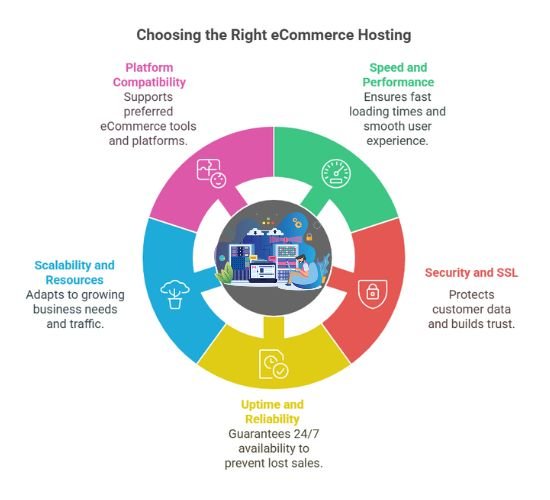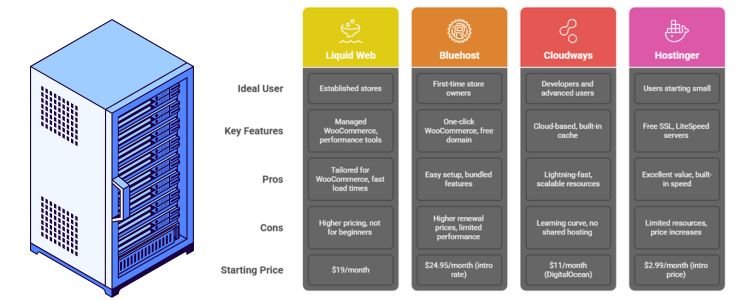When you’re running an online store, choosing the appropriate hosting means more than a mere technical decision. Iit directly influences your sales, customer trust, and search rankings. The best hosting for eCommerce ensures your site loads fast, stays secure, and handles high traffic without crashing. If you’re launching a new shop or upgrading your existing setup, the right hosting solution can make all the difference.
Key features like speed, uptime, scalability, and security are essential for any eCommerce website. Without them, even the best products may struggle to convert. That’s why understanding your options, be it shared hosting, VPS, cloud hosting, or managed WordPress hosting, is the first step toward success.
This guide will discuss everything you need to know in 2025. We’re talking about a full eCommerce hosting comparison and expert insights into WooCommerce and shop hosting requirements. Also, we’ll give you actionable advice to help you choose the plan that fits your store’s size, budget, and growth goals. If you’re serious about building a high-performing store, this is where you start. Are you ready to find the best eCommerce hosting for your business? Let’s get into it.
What to Look for in eCommerce Hosting
Not all hosting is created equal, especially when you’re running an online store. Are you launching your first website or upgrading to meet growing demand? Picking the right ecommerce hosting is one of the most important decisions you’ll make. The best hosting should support your business goals, protect your customers, and deliver a smooth shopping experience every time. In this section, we’ll break down the five key factors that separate great shop hosting from the rest.

1. Speed and Performance
There’s no doubt that speed matters. A slow-loading product page can lead to abandoned carts and lost revenue. In fact, just a one-second delay can drastically reduce your conversion rate. That’s why performance should be at the top of your list when choosing ecommerce hosting. Fast websites lead to happy customers, and more sales.
Look for these must-have features:
- SSD storage for faster data access
- CDN integration to deliver content quickly across regions
- Built-in caching to reduce page load times
2. Security and SSL
Security is non-negotiable for any online store. If you’re handling transactions or customer information, your shop hosting provider must offer strong protection. Reliable ecommerce hosting keeps both your data and your reputation safe.
Here’s what to look for:
- Free SSL certificates (a must for Google rankings and trust)
- PCI compliance for safe online payments
- DDoS protection and firewall security
- Daily backups and malware scanning for fast recovery
3. Uptime and Reliability
Every minute your shop is offline, you’re losing potential income. Don’t risk it. Your online store needs to be available 24/7. Network downtime could result in lost sales, frustrated customers, and damaged trust. While many hosts advertise “99.9% uptime,” real-world performance can vary.
Choose a host that offers:
- Independent uptime monitoring (not just promises)
- 99.99% uptime or better with proof
- 24/7 technical support to fix issues fast
4. Scalability and Resources
As your business grows, your hosting should grow with it. Starting small is fine. But your platform must be able to handle more products, more traffic, and bigger demands.
Scalable hosting options include:
- Cloud hosting or VPS hosting with flexible resource limits
- High-performance servers that support large product databases
- Auto-scaling to handle seasonal traffic spikes (like holiday sales)
5. eCommerce Platform Compatibility
Your hosting should support the tools you actually want to use. If you plan to run a WooCommerce store or use platforms like Shopify, Magento, or BigCommerce, make sure your hosting is optimized for it.
Look for hosts that provide:
- One-click installs for WordPress and WooCommerce
- Pre-configured environments for Magento or BigCommerce
- Managed WordPress hosting for easy updates, backups, and security
Top Best Hosting Providers for eCommerce Stores
Some shop hosting services are built for beginners starting a simple WooCommerce store. Whereas, others are designed to support large inventories and high-traffic sales events. To help you choose with confidence, we’ve reviewed the top ecommerce hosting providers in 2025. And our review is based on performance, ease of use, scalability, and value.
Do you need budget-friendly startup support or enterprise-grade infrastructure?This comparison will help you find the hosting provider that fits your store’s needs today and into the future.

1. Liquid Web – Best for WooCommerce Stores
Liquid Web is a top-tier choice for WooCommerce users who need power, performance, and complete control. Its managed WooCommerce hosting is optimized for speed, high traffic, and custom configurations. And that makes it a great fit for established stores. Its pricing starts at $19/month for managed WooCommerce hosting.
Key Features
- Fully managed WooCommerce environments
- Built-in performance optimization tools
- Automatic daily backups and premium support
- PCI compliance and advanced security
Pros
- Tailored for WooCommerce
- Fast load times and excellent uptime
- Expert-level customer support
Cons
- Pricing is higher than basic providers
- Better suited for serious sellers than beginners
2. Bluehost – Great for WordPress + WooCommerce
Bluehost is a beginner-friendly host officially recommended by WordPress, and offers dedicated WooCommerce hosting packages with essential features pre-installed. It’s ideal for users launching their first online store. The pricing for its WooCommerce hosting starts at $24.95/month (intro rate).
Key Features
- One-click WooCommerce installation
- Free domain name, SSL, and CDN
- Integrated payment processing
- 24/7 customer support
Pros
- Easy setup for WooCommerce
- Bundled features reduce setup time
- Strong support community
Cons
- Higher renewal prices
- Limited performance for very large stores
3. Cloudways – Best for Speed and Customization
Cloudways offers high-performance ecommerce hosting with the flexibility of top cloud platforms like DigitalOcean, AWS, and Google Cloud. It’s perfect for developers and store owners who want full control over performance and resources. The starting pricing plan for this hosting provider is $11/month (DigitalOcean base plan).
Key Features
- Cloud-based infrastructure with pay-as-you-go pricing
- Built-in cache (Varnish, Redis), HTTP/3 support
- 24/7 expert support and automated backups
- One-click app deployment including WooCommerce and Magento
Pros
- Lightning-fast load times
- Easily scalable resources
- Choice of cloud provider and data center
Cons
- Slight learning curve for beginners
- No shared hosting option
4. Hostinger – Budget-Friendly eCommerce Hosting
Hostinger is a reliable and affordable option for those starting small. It comes with strong shop hosting features like LiteSpeed caching and free SSL. The control panel is easy to use, and the price is one of the lowest around; its shared hosting starts at $2.99/month (intro price).
Key Features
- Free SSL, CDN, and automatic backups
- LiteSpeed servers for fast performance
- One-click installs for WooCommerce, PrestaShop, and more
- 24/7 customer support
Pros
- Excellent value for the price
- Built-in speed and security tools
- Easy for beginners to use
Cons
- Entry-level plans have limited resources
- Price increases on renewal
Shared vs VPS vs Cloud Hosting for eCommerce
Are you comparing shared vs VPS for eCommerce or exploring cloud hosting for online store performance? It’s important to understand how each option fits your business stage and goals. Here’s a quick comparison to get you started:
Shared Hosting
Shared hosting is the most affordable option. It’s ideal for small ecommerce hosting needs or those just starting out. Your site shares resources (like bandwidth and CPU) with others on the same server.
Pros
- Low cost and easy to use
- Great for beginners setting up a simple store
- Most providers include free SSL and one-click WooCommerce installs
Cons
- Slower performance during traffic spikes
- Less secure, due to resource sharing
- Limited support for heavy store features
VPS Hosting
VPS hosting (Virtual Private Server) gives you more control and dedicated resources without the cost of a full dedicated server. It’s ideal for growing stores that need reliable performance and more backend flexibility.
Pros
- Better speed and stability than shared hosting
- More customization for databases, apps, and server settings
- Suitable for larger ecommerce hosting setups
Cons
- Requires some technical knowledge
- Higher price than shared hosting
- May not auto-scale like cloud platforms
Cloud Hosting
Cloud hosting for online stores offers premium scalability and performance. It distributes your website across multiple servers. As a result, your site stays fast and available even during high-traffic periods.
Pros
- Lightning-fast performance and near-perfect uptime
- Automatically adjusts to traffic spikes
- Ideal for handling seasonal sales and global customers
Cons
- Slightly more complex setup for beginners
- Pricing can fluctuate based on usage
- May need third-party add-ons for backups or email
Which Hosting Type Is Right for Your Store?
If you’re Launching your first product, start with shared hosting. It’s simple, budget-friendly, and covers the basics. When you start seeing steady growth, upgrade to VPS hosting to gain more speed and flexibility for your WooCommerce store. However, if your business is scaling fast or expecting high demand, then you should choose cloud hosting for online store scalability, speed, and performance without limits.
Conclusion
Fast websites convert more, secure websites build trust, and reliable uptime means you don’t miss a sale. These aren’t opinions, but facts backed by data. A 1-second delay in load time can drop conversion rates by up to 20%. Google prioritizes HTTPS (SSL) and site speed in its search rankings. 99.99% uptime equals less than an hour of downtime per year; anything less costs you real money.
Do you want your eCommerce store to succeed? Your hosting must load fast, stay online, and keep customer data secure. In 2025, Cloudways, Liquid Web, Hostinger, and Bluehost stand out for delivering on these core needs across different store sizes and budgets.
No matter your platform; WooCommerce, Shopify, Magento, or Wix, your store’s performance starts with hosting. So don’t guess. Choose a provider proven to support growth, security, and sales. Your profits depend on it.

